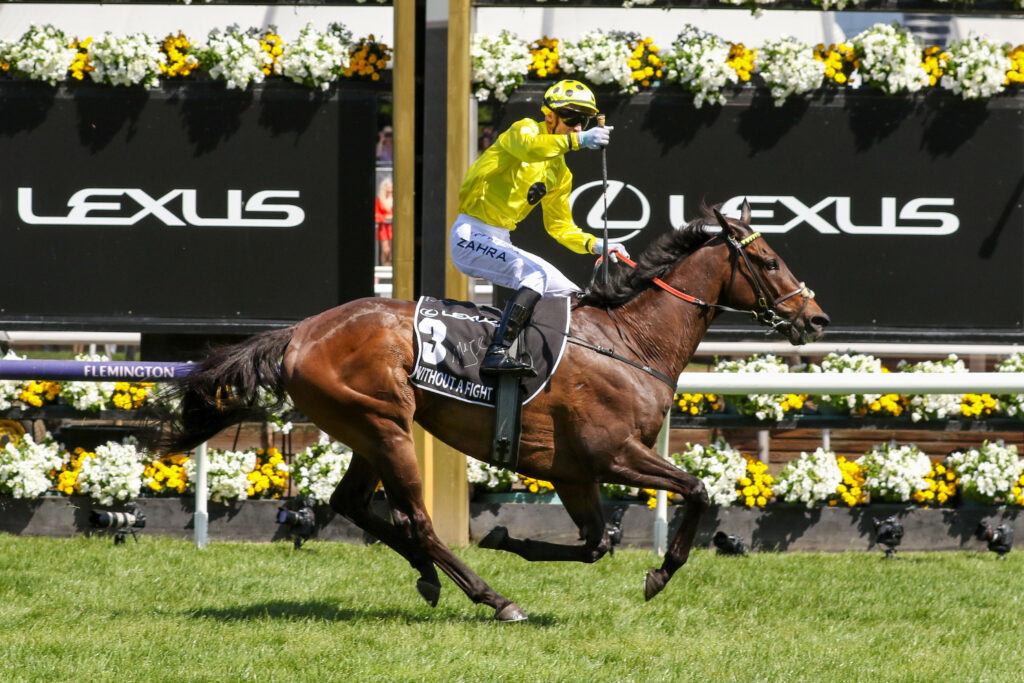Melbourne Cup day raises complicated feelings about horse racing for many Australians

- by Admin
- November 4, 2024
The racing industry has been doing everything in its power to get public sentiment back onside after many turned against it when runner Verema was euthanised on the Flemington track more than a decade ago.
That backlash hit new strides in 2019 when ABC’s 7.30 aired a segment showing the alleged mistreatment of retired racehorses that shocked the wider community.
But over the weekend, influencers and celebrities headed out to Flemington Racecourse in droves and some say the online pushback has simmered down somewhat from recent years when the hashtag #NupToTheCup was plastered all over social media feeds.
One influencer who works at the Melbourne Cup says the online vitriol and pushback is a shadow of what it was a few years ago.
Yet anti-racing protesters and animal rights advocates are optimistic that the tide has turned for good against racing, particularly among younger people, who continue to actively turn away from racing or spend the public holiday doing other things.
Celebrities hitting the track
Georgie Purcell, the Animal Justice Party MP for Northern Victoria, said she noticed a real change in feeling towards racing when influencers and celebrities started to turn down invites to attend racing events “because when they do attend, they no longer receive positive commentary online”.
Two years ago, media personality and radio host Abbie Chatfield said she had turned down “a lot” of money to go to the races and she criticised those who did go.
Some racegoers say the negative feeling towards the sport has eased in recent years. (AAP: Dave Crosling, file photo)
“Guys, I thought we were done with the races,” Chatfield posted to her Instagram stories in 2022.
“I thought that wasn’t a thing anymore. Like, why are so many people going to the races? What the hell?”
The same year, founder of Born Bred Talent agency Clare Winterbourn said she would not proactively encourage any of her clients to go to the races unless they had an authentic relationship with the sport.
“It’s one of those topics that, love it or hate it, it’s not going anywhere,” Winterbourn told The Sydney Morning Herald, adding some talent would stipulate in contracts that if they went as a guest or ambassador of sponsors, they were not to be photographed.
“Because they won’t want the public association with something that’s controversial,” she said.
Yet a lot of high-profile Australians have already been in attendance during this year’s Spring Racing Carnival, including many sporting stars.
Hitting Derby Day was Australian women’s netball team, including Diamonds captain Liz Watson, Jo Weston, Cara Koenen, Kate Moloney and Sarah Klau, AFL star brothers Nick and Josh Daicos, in arm with high-profile model fiancee Annalise Dalins, and Australia’s most decorated Olympian Emma McKeon, who launched the Birdcage as the GH Mumm ambassador for the Melbourne Cup Carnival.
Collingwood’s Josh Daicos and fiancee Annalise Dalins attended Derby Day at Flemington. (Getty Images: Wendell Teodoro)
Influencers Bec Judd and Nadia Bartel, model Olivia Molly Rogers, and comedian Andy Lee and fiancee Rebecca Harding were also in attendance over the weekend.
While these faces were splashed across social media without much pushback, TV presenter Carrie Bickmore received a slew of backlash from fans after posting photos of her at Derby Day on Saturday.
One fan wrote on her Instagram post: “Animal cruelty with a side of fashion!! How vacuous”. Another wrote: “I’m kind of disappointed you would support the races. Love you, but not this decision.”
When the race that stopped the nation started to divide it
Ms Purcell has been involved in anti-horse racing campaigns for more than a decade and is very actively involved with the Coalition for the Protection of Racehorses (CPR), which runs the “Nup to the Cup” events.
She said when she was starting out, there was a strong public sentiment in opposition to jump racing — which is now banned in every state in Australia except Victoria — but horse racing was considered fine.
However, steadily over the past 10 years there had been a shift, particularly among young people, who are turning against horse racing, she said.
Animal rights activists protest outside Flemington Racecourse ahead of the 2020 Melbourne Cup. (ABC News)
Polling by the Essential Report found that last year, 62 per cent of Australians aged 18-34 had low to no interest in the Melbourne Cup, whereas only 9 per cent had high interest.
Furthermore, Melbourne Cup Carnival attendance figures have plummeted more than 30 per cent in the past 15 years, according to the CPR.
“It feels like across the board, there’s this real move away from the industry, and that’s not just for animal welfare reasons,” Ms Purcell said.
“But of course, we now really strongly know the links between gambling harm and the fact that family violence rates rise on major race days, and for a whole range of reasons people are just choosing not to participate or support the industry.”
Ms Purcell said this had been steady since Verema was euthanased in 2013.
“That was a really first visible time that we had a horse death in a major race — and it gave us the opportunity to talk about the fact that this wasn’t some freak accident or uncommon [event], that racing actually operates year round when people aren’t paying attention, and it happens every few days,” Ms Purcell said.
The 2024 Deathwatch Report stated that 151 horses were killed in the past racing year.
Since then, Ms Purcell said the racing industry had been desperately trying to turn public sentiment back in its favour by making the Spring Carnival more appealing, including by getting artists to play on Cup day.
“I would say that the horse racing industry in particular is much more aware of the work that they have to do — as opposed to say the greyhound racing industry — in terms of community sentiment and how people feel about it,” Ms Purcell said.
“But I also just think it’s not what people want to do anymore, right? Like, we’re in a cost of living crisis. It’s expensive.”
Too good to say no to
One person who works as an entertainer during the carnival and wanted to remain anonymous due to ongoing relationships with the industry, said the carnival was the biggest earner for a lot of people within the entertainment industry — and it is money they cannot say no to.
That is particularly the case during a cost of living crisis, when small businesses or content creators that do not earn a lot during the year can cash in big.
For many people, the Melbourne Cup is more about fashion and music than horse racing. (ABC News: Rachel Clayton)
“It’s hard. But if it got to a point where I thought that me not taking the work would end horse racing, absolutely, I wouldn’t take the work. But it’s not going to, it’s never going to, and so somebody else is going to earn all that money,” the entertainer said.
They feel that in the grand scheme of the industry, their individual involvement or absence in the carnival will not make much difference either way.
They added there was a level of hypocrisy to the criticism, too, as it was coming from a society that indulged in things like fast fashion and eating meat.
They said most of the influencers and high-profile people who went to the Spring Carnival did not care much that it was horse racing, but rather were drawn to the social and fashion aspects, similar to the Australian Open or Formula 1 Grand Prix.
“Honestly, you can be there and not even look at a race. It’s more about the fashion, especially the influencers wanting to be there, the designers, all that kind of stuff, and getting to dress up and be a part of it,” they said.
What do protesters want?
Ms Purcell said, as much as she was opposed to horse racing as a whole, she was pragmatic and realistic about the industry’s longevity, particularly the marquee event, the Melbourne Cup.
So, right now, her focus is abolishing things that are clearly harmful, such as the use of the whip.
“I’ve got three horses in the paddock. If I whipped any of them at the same rate that racehorses are it would be a breach of our animal welfare laws, but they don’t apply when animals are racing.
“So I’d really like to see an end to the whip,” Ms Purcell said.
She also wants a breeding cap on racehorses, saying there is an “over-breeding crisis”.
“We know it means that horses end up in knackeries or abattoirs because there’s just not enough people who can take them on,” Ms Purcell said.
“They’re a huge commitment. They live for 30 years and they’re very, very expensive.
“So getting the industry to implement a retirement plan and a breeding cap should be the absolute number-one priority, because it just continues to worsen and worsen every year.”
The Latest News
-
November 26, 2024Leishman’s major lure driving his Australian Open push
-
November 26, 2024Making the Australian Open great again
-
November 26, 2024‘I’ve got a lot better’: Meet the Aussie who’s followed Tiger’s path to the top ahead of his Aus Open homecoming
-
November 26, 2024Predicting the jobs of tomorrow – Mining Magazine Australia
-
November 26, 2024How to avoid the middle seat on a plane for free




